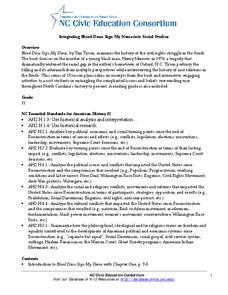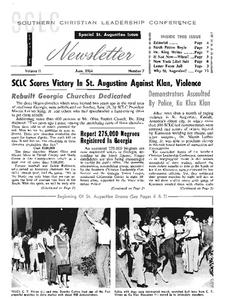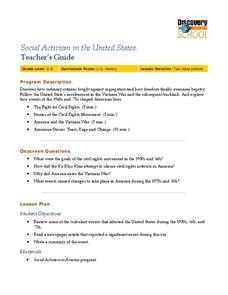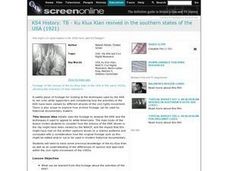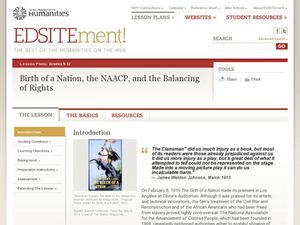University of North Carolina
Integrating Blood Done Sign My Name into Social Studies
Tim Tyson's Blood Done Sign My Name is the anchor text in a unit study of the history of race relations and the civil rights struggle in the South. The 11 lessons are richly detailed, and the unit deserves a space in your curriculum...
Core Knowledge Foundation
The Civil War
A unit covers many aspects of the Civil War. Over six weeks, fifth graders delve deep into the history of slavery, the Civil War—before, during, and after—Abraham Lincoln, women's contributions, the Emancipation Proclamation, and...
C3 Teachers
2020 Protests: Is There Anything New about the 2020 Protests?
Are marches and protests an effective form of resistance? That is the question high schoolers seek to answer in this inquiry lesson as they compare the 2020 protests to historical ones. Researchers use Venn Diagrams to compare images...
Alabama Department of Archives and History
"Scottsboro Boys": A Trial Which Defined an Age
Here's a must-have resource. Whether your focus is racism, the Great Depression, the "Scottsboro Boys" trial, or part of a reading of To Kill A Mockingbird, the information contained in the seven-page packet will save hours of...
Core Knowledge Foundation
The Civil War
A student reader shares information about the history of slavery, the Civil War, President Abraham Lincoln, women's contributions to the war, the Emancipation Proclamation, and reconstruction.
K20 LEARN
The Tulsa Race Massacre
The 1921 Tulsa Race Massacre is the focus of a activity that explores the causes and consequences of the destruction of the Greenwood section of Tulsa, Oklahoma. Pupils examine primary source images, a video clip covering the riots, and...
K20 LEARN
The Bank Of Justice: Civil Rights In The US
To launch a study of racial segregation and integration, young historians first watch a news video about a prom in Georgia that was first integrated in 2013. They then compare the goals in Lincoln's Gettysburg Address to King's "I Have a...
Newseum
'The Press and the Civil Rights Movement' Video Lesson
Scholars watch a video featuring journalists who covered the civil rights movement, then respond to questions on a viewing guide. The video features interviews with participants and original news footage from the 1950s and 1960s. In...
Digital Public Library of America
Ida B. Wells and Anti-Lynching Activism
A packet of 13 primary sources provides young historians with insight into the anti-lynching activism of civil rights Ida B. Wells. Included are images of Wells, her letters, a political cartoon, newspaper lynching announcements, and a...
C-SPAN
1968: The Poor People's Campaign
The Poor People's Campaign of 1968 marked a shift in the civil rights movement to economic issues. Speakers in four C-SPAN video clips discuss different aspects of the campaign including Resurrection City, the Economic Bill of Rights,...
Facing History and Ourselves
Violence and Backlash
Revolution and counterrevolution. Protest and counter-protest. Collaborators and bystanders. The focus of the fifth resource in the Reconstruction Era and Fragility of Democracy series is on the political violence that followed Radical...
C-SPAN
14th Amendment Equal Protection Clause
Two Supreme Court cases, Plessy v. Ferguson and Brown v. Board of Education take center stage in a lesson about the Equal Protection Clause of the 14th Amendment. Class members research both cases to compare and contrast the rulings.
Reed Novel Studies
Stella By Starlight: Novel Study
Who were the Ku Klux Klan, and what role did they play in the United States during the Great Depression? Using the Stella by Starlight novel study, scholars research the organization and answer questions relating to Sharon M. Draper's...
National Park Service
Teaching with Historic Places: Discover the Jackie Robinson Ballpark
Can sports and popular culture change public opinion? That's the essential question asked by a lesson plan that looks at the role Jackie Robinson's appearance at City Island Ballpark in Daytona Beach, Florida played in the desegregation...
Freedom Archives
Special St. Augustine Issue
The articles and images in the June 1964 edition of the Southern Christian Leadership Conference Newsletter detail the events in St. Augustine that were instrumental in the passing of the Civil Rights Act of 1964. The stirring...
Alabama Department of Archives and History
Marketing a Bad Idea: Why So Many People Joined the Klan in the 1920s
How did the Klu Klux Klan manage to gain so many members during the 1920s? Class members examine Klan documents and promotional materials to gain an understanding of the propaganda techniques used to attract members.
Curated OER
Social Activism in the United States
Seventh graders explore the goals of the Civil Rights Movement of the 1950s and 1960s. In this US History lesson, 7th graders read a newspaper article that reported a significant event during this era. Students write a...
Curated OER
USA: the KKK and Civil Rights Movement
Learners view film footage of the Ku Klux Klan in the U.S. in the early 1920s and examine how the actions of the KKK have been viewed by different strands of the civil rights movement. They watch the film and answer discussion...
Curated OER
A Closer Look at the Klan
Fourth graders learn vocabulary, answer discussion questions, complete writing assignments, and identify symbols connected to the Ku Klux Klan. In this Ku Klux Klan lesson plan, 4th graders also go on a field trip to the Thomas Hart...
Curated OER
Ku Klux Klan
High schoolers discuss, write, and identify symbols of the activities of the Ku Klux Klan in the 1920's in Indiana. In this Ku Klux Klan lesson plan, students also take a field trip to view the Thomas Hart Benton Murals at Indiana...
Curated OER
Birth of a Nation, the NAACP, and the Balancing of Rights
Eleventh graders analyze primary sources. In this US History activity, 11th graders interpret written information. Students evaluate arguments and draw conclusions. Students develop and defend a position.
Curated OER
The Fears of Black Americans during and after Reconstruction
In this segregation study guide worksheet, middle schoolers discover details regarding the fears of Black Americans following Reconstruction. Students read 3 sections of information and examine photographs.
Curated OER
The Ku Klux Klan In Indiana: 1920-1930
Students examine the role of the Ku Klux Klan in Indiana from 1920-1930. They read an informational handout, define key vocabulary terms, conduct an interview with a parent or grandparent, write a family history, and role-play a scenario.
Digital History
Digital History: The Ku Klux Klan
A look at the resurgence of the Ku Klux Klan after World War I in response to the agricultural depression and the migration of African Americans into northern cities. Read about its swift growth, and equally swift loss of members by the...


